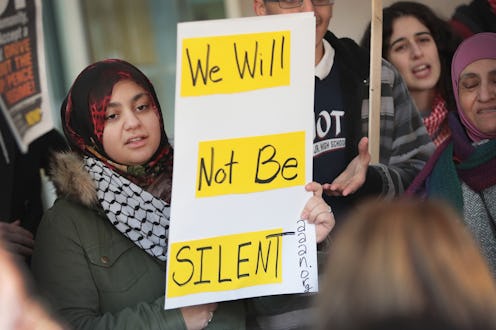
In a decided victory for President Trump Tuesday night, the Supreme Court dismissed a case against the travel ban, which restricted travel from a group of majority-Muslim countries. The Court said that they would not hear the case because the ban in question expired on Sept. 24.
"We express no view on the merits," the Court said in its one-page summary.
Justice Sonia Sotomayor dissented from the decision, which was officially to vacate judgement, because she would have preferred to dismiss the case in a way that left rulings by the 4th Circuit Court of Appeals in place. The way that the case was dismissed effectively wipes the case against the travel ban clear, meaning any new opposition would have to begin from the ground up.
The 4th Circuit was one of two appeals courts to rule against portions of the travel ban. Another case regarding a challenge by the 9th Circuit in California remains pending, most likely because it deals with part of the ban that is still in place, concerning refugees. That piece of the ban expires later this month.
The challenge that the Supreme Court dismissed on Tuesday, Trump v. International Refugee Assistance Project, originated from Maryland, and was brought against Trump by in part by the American Civil Liberties Union (ACLU). It alleged that banning travel from a series of majority-Muslim countries violated the first amendment because it violated the right to freedom of religion.
In their decision, the Supreme Court instructed the 4th Circuit Court to dismiss the case as moot.
The Supreme Court justices most likely ruled that the original travel ban expired on its own on Sept. 24 because on that day, Trump signed a new travel ban into place, reporter Amy Howe explained on the SCOTUS Blog. He altered the countries included on the ban, finalizing it as a ban against Somalia, Syria, Libya, Iran, Yemen, North Korea, Venezuela and Chad.
The new ban, which goes into effect Oct 18., is not a blanket ban, as the earlier version was. The new version treats the countries differently and differentiates between different types of travelers.
The Washington Post reported that both immigrants and nonimmigrants will be banned from "Chad, Libya and Yemen on business, tourist, or business-tourist visas." Immigrant and nonimmigrant by Iranian citizens will also be banned, except in the case of students. Further, immigrants and nonimmigrants from North Korea and Syria will also be banned, as well as immigration by Somalians.
The second case, Trump vs. Hawaii, is expected to be dismissed once the relevant refugee ban expires, according to multiple reports.
September's ban was the third issued since Trump took office. His first was in January, issued via executive order. It banned immigration from seven majority-Muslim countries and resulted in widespread panic and protest at airports across the United States. The Trump administration then signed a second travel ban in March. That ban restricted travel from six majority-Muslim countries. It was the impetus for the two cases scheduled to appear before the Supreme Court this month. While the original bans had expiration dates, September's ban will be indefinite.
The Supreme Court ruled in September that most of the refugee ban could remain in place while it prepared to hear arguments in October.
As a presidential candidate, Trump was reported to have called for a "total and complete shutdown of Muslims entering the United States" as early as Dec. 2015. As such, it was one of his first actions as President.
As it stands, it is possible that challenges to the latest iteration of the travel ban could eventually reach the Supreme Court. Several lawsuits combatting the ban have already been filed.